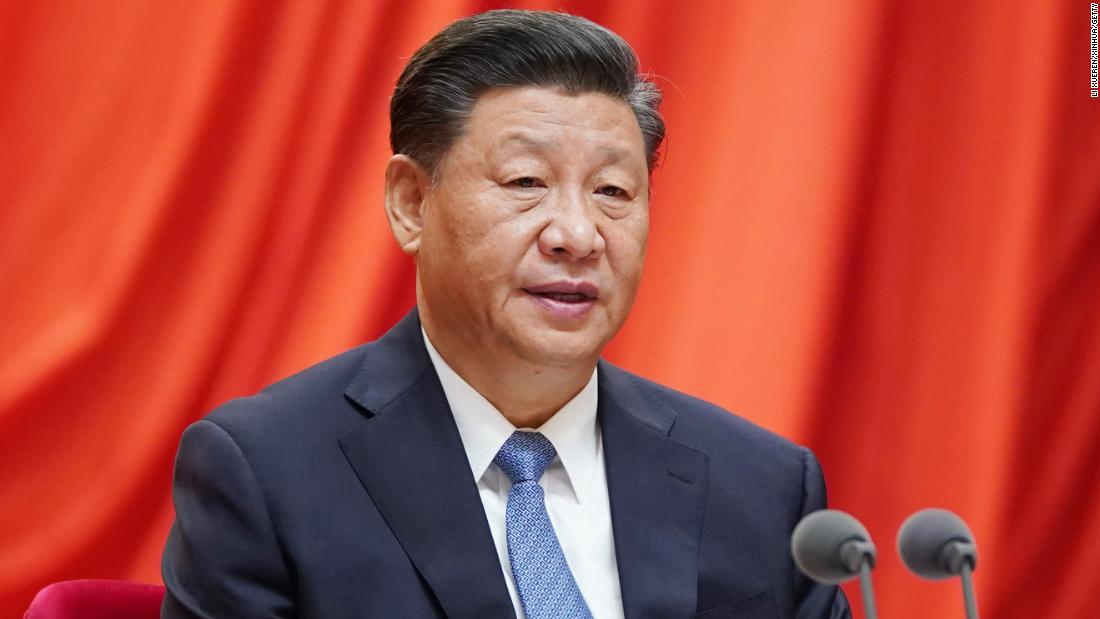China sends warplanes near Taiwan 0:43
Hong Kong (CNN Business) -
China wants to lead the global recovery from the pandemic and be more influential than ever on the world stage.
You may have the drive and the confidence to carry out that plan.
The world's second-largest economy weathered much of the fallout from the COVID-19 pandemic last year, and its ability to keep growing as the world slipped into recession could mean its GDP overtakes that of the United States by the end. of this decade, years earlier than expected.
"China emerged from the impact of COVID-19 before the rest of the world and the authorities are already planning for the long term," wrote Françoise Huang, senior economist for Asia-Pacific at Euler Hermes, in a report last week titled "The world is moving eastward, fast.
China just surpassed the United States in attracting foreign direct investment for the first time.
And as 2020 drew to a close, it signed a trade agreement with the European Union with the aim of boosting growth and giving European companies greater access to its 1.4 billion consumers.
Now, Beijing is starting the new year without one of its most aggressive political adversaries, former US President Donald Trump, breathing down its neck.
Chinese President Xi Jinping has already made it clear that he sees China taking the top spot next year and beyond.
During the World Economic Forum's "Davos Agenda" virtual event on Monday, Xi adopted a confident tone as he recounted the ways his nation has sent aid to other countries and prompted the world to work together, repeating a message on the benefits from the globalization he gave when he became the first Chinese leader to appear at Davos in 2017.
advertising
And he touted China's ability to boost the global economy by injecting "more growth momentum."
China "will take advantage of its large market advantages and the potential of domestic demand to provide more opportunities for cooperation between countries and global economic recovery," Xi said.
Xi was certainly projecting confidence, said William Reinsch, a trade expert at the Center for Strategic and International Studies (CSIS) who served for 15 years as president of the National Council for Foreign Trade.
LEE
: China's fighter jets fly over near Taiwan in first challenge to Biden
But a series of geopolitical challenges, including clashes over Hong Kong and alleged human rights abuses in China's Xinjiang region, have exacerbated tensions with the West and may hamper efforts to foster multilateral cooperation.
"[Xi] is squandering China's global influence through increasingly provocative actions in Xinjiang, Hong Kong, the South China Sea and with respect to Taiwan," Reinsch told CNN Business.
"These actions are unacceptable to democracies, and I think we will continue to see them move away from China despite its attractiveness as a market," he added.
For now, at least, China's relative economic strength is hard to ignore.
Major global funds like Fidelity and Invesco just poured hundreds of millions of dollars into a Chinese app similar to TikTok, while US brands like Costco, Tesla and Starbucks have also been investing more aggressively there.
The country was able to borrow at negative interest rates for the first time last year, attracting large investors from around the world, including Europe and the United States.
'Trust in China'
Following accusations that it mishandled the initial crisis in Wuhan, China responded with an intense and unprecedented lockdown of the original epicenter that paralyzed life in the city for months.
The strict measures seemed to work.
While China is still battling some COVID-19 cases, its numbers are nowhere near the levels seen in Europe and the United States.
Authorities were also able to reopen large sectors of the economy last year, even as other nations remained closed.
In total, tough quarantine measures and additional actions aimed at stimulating growth - the country also financed major infrastructure projects and offered cash handouts to citizens - helped China's economy expand 2.3% in 2020 while much of the world was mired in recession.
"In and out of the lockdown before everyone else, the Chinese economy advanced as much of the world struggled to maintain balance," Frederic Neumann, co-director of Asian economic research at HSBC, wrote in a report last week.
LEE
: A year after the confinement, Wuhan returns to normal life, but is still haunted by emotional scars
Given China's rapid growth over the past several decades, many economists were already forecasting that it would overtake the United States sometime after 2030. But the country's ability to weather the pandemic is accelerating that trend.
"Skillful management of the pandemic and long-term growth impacts in the West mean that China's relative economic performance has improved," researchers from the Center for Business and Economics wrote in a December report.
Now they expect China to overtake the United States five years ahead of schedule.
Chinese state media, often seen as a barometer of sentiment among senior officials, have been touting the country's economic success.
The Global Times, a state-owned tabloid, on Sunday took advantage of a report from the United Nations Conference on Trade and Development showing that China received more foreign direct investment than the United States last year.
“China has faced the trade war started by the United States and the country's strategic containment against China.
But China in general has stood the test, ”wrote the editorial board of The Global Times.
"All of this adds to the outside world's confidence in China."
The investment trend is likely to recede as the United States and Europe rebound, according to Dan Blumenthal, director of Asian studies at the American Enterprise Institute.
"[Foreign] companies will eventually be pushed out by Chinese competitors and China's panoply of anti-competitive practices," he said.
"Still, given China's scale and ambition, it is a formidable competitor for the United States."
Challenges ahead
China is not without its challenges.
Economists emphasize that there are still threats to the future growth of the country.
The International Monetary Fund said in December that China's recovery has largely relied on government support, while private spending has not been sustained.
Others point out that a large number of bankruptcies and loan defaults in state-owned companies have strained debt markets.
"The political response to the COVID-19 pandemic, while effective in the short term, is driving more resources to inefficient state-owned enterprises and will increase China's debt burden," wrote Julian Evans-Pritchard, China's senior economist at Capital Economics, in a research report last week.
Debt problems have followed China for years, overshadowing economic policy.
On Monday, a lawmaker from the People's Bank of China expressed concern during a speech in Beijing that local governments were setting GDP targets that were too aggressive.
That increased the risk of accumulating debt, given the relative ease with which the economy can be profited by borrowing more money, said the official, Ma Jun.
Ma even suggested that Beijing should abandon national GDP targets and instead prioritize employment and control inflation.
There is another potential drag on China's growth in the coming years.
In general, it has tried to reduce its dependence on the West in recent years.
(For example, China's leading chipmaker SMIC has been hampered by recent US restrictions on its business.)
LEE
: Foreign companies move away from the US and bet heavily on China, according to a report
That is related to increased concern for China.
While President Joe Biden might have a more nuanced tone toward Beijing than Trump did, they don't expect him to completely undo the trade war or abandon efforts to reassert the United States as a world leader in economics and trade.
Biden "has prioritized fighting COVID and restoring growth to our economy, but he's a multilateralist at heart," said CSIS's Reinsch.
"Once you have made progress on your national goals, you will also turn your attention to global trade issues."
Laura He contributed to this report.
China








